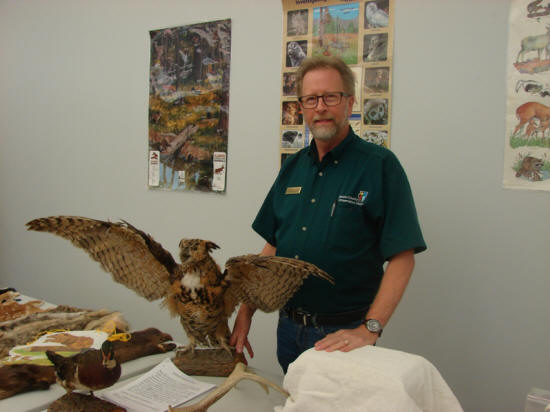|
 Summer
Library Reading: Kids gain appreciation of wild animal
characteristics with Macon County Conservationist visit Summer
Library Reading: Kids gain appreciation of wild animal
characteristics with Macon County Conservationist visit
 Send a link to a friend
Send a link to a friend
[July 01, 2017]
LINCOLN
- The Lincoln Public Library welcomed Jeffrey Tish from the Macon
County Conservation District to the summer reading program on
Thursday morning. Tish, a naturalist with forty-one years of
experience, presented a program about animal adaptations.
|
|
 When asked to define his profession, he said “a
naturalist is a person who teaches about nature.” When asked to define his profession, he said “a
naturalist is a person who teaches about nature.”
Simple enough, but nature is extremely complex and that was the
focus of his talk to the young readers. “Animal adaptation is all
about how nature provides animals with unique sounds, colors, sight,
hearing, fins and feathers to help with their survival,” he said.
Jeffrey Tish is one of several naturalists who travel from Decatur
to surrounding libraries to present programs based on the research
done at the Macon County Conservation District. The district is
centered at Rock Springs Nature Center south of Decatur and includes
five parks and 3,500 acres of natural central Illinois landscape.
“We host over 10,000 kids a year at our outreach and camp programs,
and have another 35,000 visitors,” he said. “Rock Springs is only an
hour away from Lincoln and would make a great adventure for a
family, one that would provide a wonderful memory for everyone,” he
added.

Animal adaptations take all sorts of forms. Beavers are known for
lunching on trees. But did you know that a beaver’s teeth are always
growing? That is why small chips break off from their teeth every
time they are used. That way their teeth always fit in their mouth.
That is one example of an adaptation.
A coyote’s coat is tan, black, and brown so it can blend in with the
surrounding trees and shrubs. This is another form of adaptation
that allows the coyote to remain hidden as it stalks animals.
The great horned owl has one ear that is slightly
higher than the other. This allows the owl to tell from which
direction a sound is coming, maybe a small animal that will provide
its next meal.
[to top of second column] |

Turtles have a hard shell to
protect them.
Fawns have spots on their coat that allows them to blend in with
their surroundings. Fawns also have no odor so they cannot be
located by other animals through smell.
These are all forms of animal adaptation that helps with
survival. Then there is the skunk. "But we all know what the
skunk’s adaptation is,” said Jeffrey Tish. If you see a skunk
close by raise its tail, run like the wind!
“It’s fun to wander around and observe nature, but it is very
important that we do not disturb it. If you see a baby animal
for instance, do not pick it up and take it home. It will not
survive. That goes for turtles and other wildlife we find in
central Illinois,” Jeffrey Tish cautioned his young audience.
The Lincoln Public Library Summer Reading program “Reading by
Design” continues its Thursday morning entertainment for another
month. Youth Librarian Melissa Oxborrow stated that is not too
late to sign up to enjoy the reading and projects that the
library has planned. Contact her at 217-732-5732.
[Curtis Fox]

|